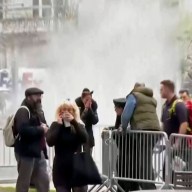SEOUL, South Korea – North Korea demanded Thursday a four-fold increase in wages for its workers employed by South Korean-owned companies at an industrial park at the center of a major dispute roiling their relations, an official said. It also demanded a 31-times increase in the rent for the site.
The unexpectedly large demand is likely to set back reconciliation moves between the two countries, which have been slowed down enormously by North Korea’s recent nuclear and missile tests and the detention of a South Korean worker at the industrial park.
A total of 106 South Korean companies have factories in the park in Kaesong, a North Korean border town, employing some 40,000 North Koreans. They are paid about US$70 a month on average.
The increased wage demand was made during a 90-minute meeting between civilian officials from the two sides at Kaesong – only the second such meeting in more than a year, a reflection of their deeply frayed relations.
Pyongyang demanded that South Korea raise the monthly wages of the workers at the complex to $300 in the first year, Unification Ministry spokeswoman Lee Jong-joo said.
She said North Korea also wanted a 10 to 20 per cent wage increase in subsequent years and a rent of $500 million for the 3.3 million-square-metre site. Under an agreement between the two countries, North Korea has already received $16 million as rent for 50 years.
Although it was expected that North Korea would ask for higher salaries during the talks, an increase of more than four times was a surprise and is unlikely to be accepted by the South Koreans who pay about $170 a month to Chinese laborers in their factories in China.
“That’s nonsense!” Park Jung-ho, a former official of a shoe factory operating in Kaesong, said of the North’s wage demand. “We have to look at the productivity of North Korean workers. If South Korean workers produce, say, 100, North Koreans only produce 30.”
The corporate council of the South Korean companies in Kaesong said it has no immediate comment on the North’s demand.
When it was set up in 2004, the Kaesong Industrial Complex was seen as the most potent symbol of reconciliation between the two nations on the divided peninsula. It combined the South’s capital and technology with the North’s cheap labor. But today, the only remaining reconciliation project appears to be on its last legs.
North Korea blames the situation on the hard-line attitude of a pro-U.S., conservative government that took office in Seoul last year, advocating a tougher policy on the North. In retaliation, the reclusive regime cut off ties, halted all major joint projects except the Kaesong complex and significantly restricted border traffic.
Thursday’s demand came as Western powers agreed with North Korea’s allies on a proposal to punish it for its latest nuclear test on May 25. The new sanctions would put tough restrictions on Pyongyang’s exports and financial dealings, and allow inspections of suspect cargo in ports and on the high seas.
The agreement awaits approval by the United Nations Security Council.
During Thursday’s talks, South Korean officials demanded the release of a compatriot detained at the Kaesong Industrial Complex since late March for allegedly denouncing the North’s political system, South Korean Unification Ministry spokesman Chun Hae-sung said.
The communist regime has rejected South Korea’s repeated requests for his release, and details of his status remained unclear.
The South Korean government says it was committed to developing the Kaesong complex despite the problems between the two countries.
But some companies appear to be losing patience. Earlier this week, a South Korean fur-garment manufacturer announced that it was pulling out of Kaesong, citing security concern for its employees.
Experts said Thursday’s meeting would not achieve much as the North will likely use the case to show how badly relations between the two sides have frayed because of Seoul’s hard-line policy on Pyongyang.
“I think the North is trying to show that it cannot free Yu unless the South drops its hostile policy and turns back toward a reconciliation and cooperation policy,” said Paik Hak-soon, a senior analyst at the Sejong Institute, a South Korean think tank.
Some experts say the North’s recent actions are largely aimed at mustering support for the country’s absolute leader Kim Jong Il as he reportedly prepares to announce his successor – his third and youngest son Jong Un.
Kim, 67, is said to have suffered a stroke, and underwent brain surgery last summer.
Little is known about the workings of the insular nation, and most of the information comes out through occasional defectors, South Korea’s spy agency and South Korean media sources in the North.
















